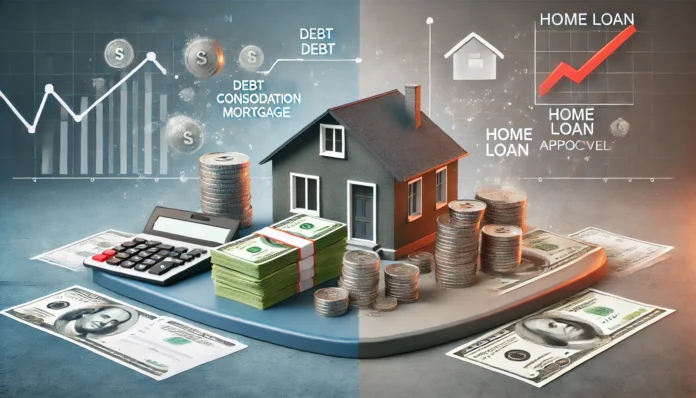Understanding Debt Consolidation for Student Loan Borrowers
Student loan debt remains a significant financial burden for millions of borrowers. For homeowners who also carry student loan debt, exploring options such as a debt consolidation mortgage or a debt consolidation home loan can provide a pathway to financial relief. These strategies allow borrowers to consolidate high-interest debts, such as student loans and credit cards, into a single loan secured by their home. Understanding how each of these options works and their implications is essential before making a financial decision.
You may also like: Federal Direct Consolidation Loan: A Smart Strategy to Simplify Student Debt
Debt consolidation through a mortgage or home loan involves leveraging home equity to secure a lower interest rate and streamlined repayment terms. However, using home equity to consolidate student loan debt carries risks that must be carefully considered. Borrowers must weigh the advantages of lower monthly payments and interest rates against the potential downsides, such as the risk of foreclosure if payments are missed.

How a Debt Consolidation Mortgage Works
A debt consolidation mortgage is a refinancing strategy that allows borrowers to roll multiple debts into their home mortgage. This method provides the benefit of a lower interest rate compared to unsecured student loans and credit cards. By consolidating debt into a mortgage, borrowers make a single monthly payment instead of managing multiple obligations.
One significant advantage of this approach is the potential for lower overall interest costs over time. Mortgage interest rates are typically lower than those of student loans and personal loans, making this an attractive option for borrowers with high-interest debt. Additionally, consolidating student loans into a mortgage can provide tax benefits, as mortgage interest is often tax-deductible. However, borrowers must consider the long-term implications, as extending the repayment period can result in paying more interest over the life of the loan.

Understanding a Debt Consolidation Home Loan
A debt consolidation home loan is another method for homeowners to consolidate debt using the equity in their property. Unlike a debt consolidation mortgage, which involves refinancing the existing mortgage, a home loan provides a separate loan secured by home equity. This loan is used to pay off student loans and other debts, allowing borrowers to repay one loan instead of several.
One key difference between a home loan and a debt consolidation mortgage is flexibility. A home equity loan provides a lump sum of money that can be used to pay off student loans, while the borrower continues to make mortgage payments separately. The advantage of this approach is that it does not require refinancing the primary mortgage, which can be beneficial for homeowners with favorable mortgage terms. However, it also carries risks, including the possibility of foreclosure if the home loan payments are not met.

Comparing Debt Consolidation Mortgage vs. Home Loan
The decision between a debt consolidation mortgage and a debt consolidation home loan depends on various factors, including the borrower’s financial situation, current mortgage terms, and long-term goals. Understanding the benefits and drawbacks of each option is crucial for making an informed decision.
A debt consolidation mortgage is best suited for borrowers who want to streamline their finances and reduce interest rates on student loans. Since mortgage rates are generally lower than student loan interest rates, refinancing student debt into a mortgage can lead to significant savings. However, this method requires refinancing the entire mortgage, which may not be ideal if the borrower already has a low-interest mortgage rate.
A debt consolidation home loan, on the other hand, provides more flexibility by keeping the mortgage separate from other debts. Borrowers who prefer to maintain their current mortgage terms but still consolidate student loans can benefit from this option. However, home equity loans often come with variable interest rates, which can lead to fluctuations in monthly payments.
Risks and Considerations of Using Home Equity for Debt Consolidation
While consolidating student loans through a debt consolidation mortgage or debt consolidation home loan can provide relief, it is not without risks. The primary concern is the risk of foreclosure. Since these consolidation methods involve securing debt with home equity, missing payments can result in the loss of the home. Borrowers must assess their ability to meet monthly payments before proceeding with this strategy.
Another consideration is the impact on overall financial flexibility. Converting unsecured student loan debt into secured debt tied to a home means that the borrower’s financial situation is more directly connected to property value. If home values decline or interest rates rise, borrowers may face additional financial challenges.
Alternatives to Debt Consolidation Mortgages and Home Loans
For borrowers who are hesitant to use home equity to consolidate student loans, there are alternative strategies to consider. Federal student loan borrowers may qualify for income-driven repayment plans, which adjust monthly payments based on income and family size. Additionally, student loan refinancing through private lenders may provide lower interest rates without requiring home equity as collateral.
Before choosing a debt consolidation mortgage or debt consolidation home loan, borrowers should explore all available options and consider consulting a financial advisor. Understanding the implications of each strategy can help ensure that the chosen approach aligns with long-term financial goals and stability.
Frequently Asked Questions (FAQ)
How does a debt consolidation mortgage work?
A debt consolidation mortgage allows homeowners to combine multiple debts into a single mortgage loan, often with a lower interest rate. By using home equity, borrowers can pay off high-interest debts such as credit cards, personal loans, and other outstanding obligations. This type of refinancing provides the advantage of a single, manageable monthly payment, reducing financial strain. However, it also extends the mortgage term, which may result in paying more interest over time. Careful financial planning is essential to ensure that a debt consolidation mortgage leads to long-term savings and debt reduction.
What are the benefits of using a debt consolidation home loan?
A debt consolidation home loan provides several financial advantages, including lower interest rates compared to unsecured loans. Because these loans are secured by property, they often come with extended repayment terms, making monthly payments more affordable. Additionally, consolidating debt through a home loan simplifies financial management by replacing multiple payments with a single monthly obligation. Borrowers may also see an improvement in their credit score over time, as debt consolidation reduces credit utilization and helps maintain consistent payments. However, it’s essential to evaluate whether extending mortgage debt aligns with long-term financial goals.
How does a debt consolidation mortgage affect home equity?
Using a debt consolidation mortgage to pay off unsecured debts decreases available home equity since borrowers are essentially borrowing against their property. While this can provide immediate financial relief, it also means homeowners have less equity available for future needs, such as home renovations or emergencies. If property values decline, homeowners with high loan-to-value ratios may find themselves with negative equity. Therefore, a debt consolidation mortgage should be considered only if the borrower is confident in their ability to manage long-term financial commitments. Responsible borrowing and timely repayment are crucial to maintaining equity and financial security.
What are the risks associated with a debt consolidation home loan?
While a debt consolidation home loan offers financial relief, it also comes with risks that borrowers must carefully consider. The primary risk is that failure to make mortgage payments could lead to foreclosure, as the home serves as collateral for the loan. Additionally, extending mortgage debt over a longer period can result in paying more interest over time, even if monthly payments are lower. Some borrowers may also develop a false sense of financial security and accumulate new unsecured debt, negating the benefits of consolidation. To minimize risks, it’s important to maintain disciplined financial habits and avoid unnecessary borrowing after consolidating debt.
How do interest rates compare between a debt consolidation mortgage and other debt relief options?
A debt consolidation mortgage typically offers lower interest rates than credit cards and personal loans because it is secured by property. Compared to unsecured debt consolidation loans, a mortgage refinance can significantly reduce the cost of borrowing, making repayment more manageable. However, compared to balance transfer credit cards with 0% APR introductory offers, a mortgage refinance may not always be the most cost-effective short-term solution. Additionally, fees associated with refinancing, such as closing costs and appraisal expenses, should be factored into the overall cost. Evaluating different consolidation options ensures that borrowers choose the most financially beneficial approach.
Can a debt consolidation home loan improve credit scores?
A debt consolidation home loan can have a positive impact on credit scores over time, provided that payments are made consistently. By paying off high-interest credit cards and reducing credit utilization, borrowers may see an improvement in their credit profile. Additionally, having fewer open accounts with outstanding balances can make debt management easier and reduce the risk of missed payments. However, a temporary dip in credit scores may occur due to a hard inquiry and the closing of older credit accounts. Responsible financial management following consolidation is essential to maximize credit score benefits.
What are the qualifications for obtaining a debt consolidation mortgage?
To qualify for a debt consolidation mortgage, borrowers must typically meet lender requirements related to credit score, income stability, and home equity. A strong credit history increases the likelihood of approval and access to favorable interest rates. Lenders also assess a borrower’s debt-to-income ratio to determine their ability to manage mortgage payments after consolidation. Additionally, sufficient home equity is required to cover the amount being borrowed, as mortgage refinances are typically limited to a percentage of the home’s value. Understanding these qualification criteria can help borrowers prepare for a successful application process.
When does it make sense to choose a debt consolidation mortgage over other debt solutions?
A debt consolidation mortgage is ideal for homeowners with substantial equity who want to lower their overall interest costs and simplify debt repayment. It makes the most sense when the new mortgage rate is significantly lower than the interest rates on existing debts. Borrowers who plan to stay in their homes long-term and have stable income may benefit the most from this option. However, individuals with limited home equity or those planning to sell their home in the near future may find other debt solutions more suitable. Careful financial analysis is necessary to determine if a mortgage refinance aligns with long-term financial objectives.
How can borrowers avoid accumulating new debt after using a debt consolidation home loan?
After securing a debt consolidation home loan, borrowers should adopt disciplined financial habits to avoid falling back into debt. Creating a detailed budget that prioritizes savings and essential expenses can prevent reliance on credit cards for daily spending. Limiting discretionary purchases and maintaining an emergency fund can also reduce the likelihood of future financial strain. Additionally, monitoring credit card usage and making timely payments on all obligations ensures continued financial stability. The key to successful debt consolidation is not just eliminating existing debt but also developing sustainable financial practices.
What are the alternatives to a debt consolidation mortgage for managing debt?
For homeowners who are unsure about using a debt consolidation mortgage, several alternative debt management strategies exist. Balance transfer credit cards with 0% interest promotions can provide short-term relief for high-interest debt. Personal loans with fixed interest rates offer another unsecured consolidation option for those who prefer not to leverage their home equity. Debt management plans from nonprofit credit counseling agencies can also help individuals structure repayment plans without taking on new loans. Each alternative has its advantages and potential drawbacks, so comparing all available options ensures the best financial decision is made.
Final Thoughts: Choosing the Right Strategy for Student Debt Relief
Managing student loan debt requires careful planning, and homeowners have unique options through debt consolidation strategies. A debt consolidation mortgage can provide lower interest rates and simplified payments, while a debt consolidation home loan offers flexibility without refinancing an existing mortgage. However, both options carry risks that must be considered before leveraging home equity for student loan repayment.
Borrowers should assess their financial goals, current mortgage terms, and repayment ability before making a decision. While these strategies can offer relief, they are not suitable for everyone. Exploring alternative repayment plans, refinancing options, and professional financial guidance can help borrowers determine the best approach to managing student debt effectively.
student loan repayment, financial planning for homeowners, loan consolidation strategies, mortgage refinancing options, managing student debt, financial literacy, home equity loans, mortgage debt relief, student loan consolidation, responsible borrowing, smart financial decisions, debt repayment guidance, mortgage financing strategies, personal finance for graduates, understanding loan terms, debt relief alternatives, interest rate management, student loan refinancing, financial stability planning, homeownership and debt management
Further Reading:
What’s the Difference Between Debt Consolidation and Debt Settlement?
Debt Consolidation vs. Debt Settlement: Which Is Better?
Debt consolidation or debt settlement — what should you choose?
The information provided in this article is for general informational purposes only and is not intended to constitute financial, investment, legal, tax, or other professional advice. The content should not be relied upon for making any financial or investment decisions. Readers are encouraged to consult with licensed professionals, such as financial advisors, attorneys, or tax experts, to obtain personalized advice tailored to their individual circumstances. The author and publisher disclaim any liability for any actions taken or not taken based on the information provided in this article.





